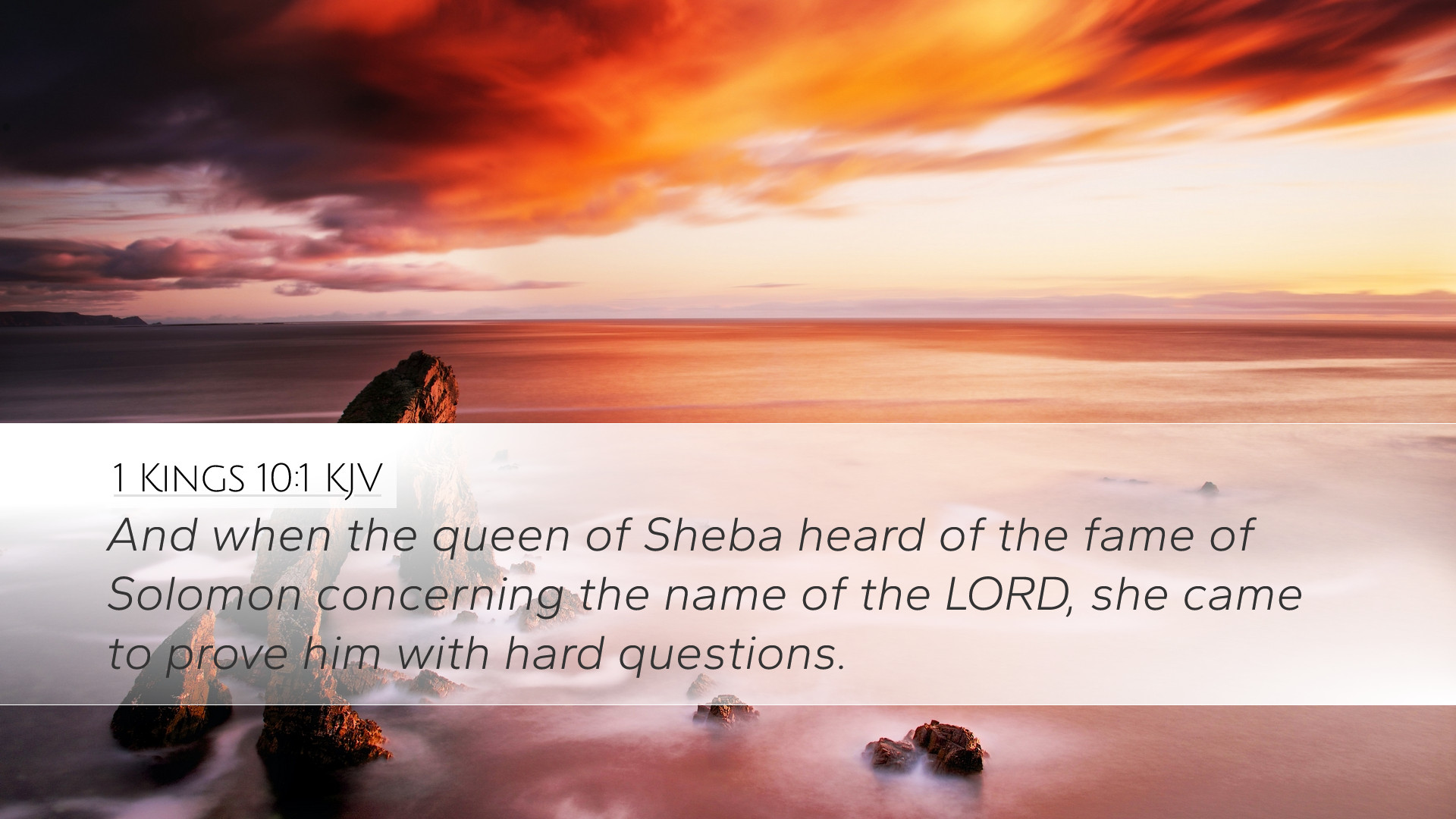Commentary on 1 Kings 10:1
Verse Overview:
1 Kings 10:1 recounts the visit of the Queen of Sheba to King Solomon, drawn by the fame of his wisdom and the glory of his kingdom. This verse lays the groundwork for understanding the broader narrative of Solomon's reign, his wisdom, and the far-reaching influence of his rule.
Contextual Background
The historical context of 1 Kings is essential for understanding its significance. David, Solomon's father, had unified Israel and established a strong kingdom. Solomon, known for his wisdom, was the architect of an era of peace and prosperity. The response of foreign dignitaries, particularly the Queen of Sheba, reflects the extent of his renown.
The Queen of Sheba's Arrival
1. Curiosity and Searching for Wisdom
As noted by Matthew Henry, the Queen's journey signifies more than mere curiosity; it represents a quest for wisdom and understanding. This is mirrored in her approach—she came to test Solomon with hard questions. This desire for knowledge leads to profound insights about her own motivations and the universal pursuit of truth.
2. Purpose Behind the Visit
Albert Barnes emphasizes that her visit was not solely for entertainment; she aimed to engage Solomon's wisdom. This interaction illustrates an important concept: wisdom is not an isolated trait but has the power to attract even the distant and powerful.
Theological Implications
The Queen of Sheba’s visit raises key theological questions about God’s wisdom and its manifestation through human agents. Adam Clarke notes that it is an affirmation of God’s promise to give wisdom to those who seek it. Her inquiry and the subsequent dialogue exemplify how God’s gifts can lead others to seek Him.
Symbolism of the Queen of Sheba
The figure of the Queen of Sheba represents the Gentile nations' acknowledgment of God's work through Israel. This theme is echoed throughout scripture, where Gentiles look to Israel for insight and guidance. Barnes highlights her status, as she stands as a monarch amongst monarchs, emphasizing God’s promise that all nations would be drawn to Him through Israel.
Solomon's Reputation
Solomon's fame is not simply about his wealth or power but centers on his God-given wisdom. The Queen’s visit serves to reaffirm this reputation. Henry suggests that wisdom is a magnet, attracting not only friends but also those seeking the truth, thus advocating for the pursuit of wisdom as a divine virtue.
Lessons for Today
The visit of the Queen of Sheba teaches modern readers, especially pastors and theologians, vital lessons about the nature of wisdom and its power in attracting seekers. Clarke posits that true wisdom leads to humility and reverence before God. Pastors can draw lessons on how their own wisdom and faith can be a beacon for those searching for spiritual answers.
Practical Applications:
- The Importance of Seeking Wisdom: Encourage congregants and students to seek wisdom earnestly, emulating the Queen’s desire for understanding.
- Witness to the Nations: Use the narrative to remind believers of their calling to be witnesses in a world that seeks truth.
- God's Sovereignty: Reflect on how God orchestrates events to bring seekers to His wisdom through His servants.
Conclusion
In sum, 1 Kings 10:1 serves as a profound reminder of the timeless allure of divine wisdom and its ability to transcend borders and cultures. The insights from Matthew Henry, Albert Barnes, and Adam Clarke encapsulate the glory of Solomon’s reign and the wisdom bestowed upon him by God, pointing to a deeper understanding of our own roles in reflecting God's wisdom to the world.


